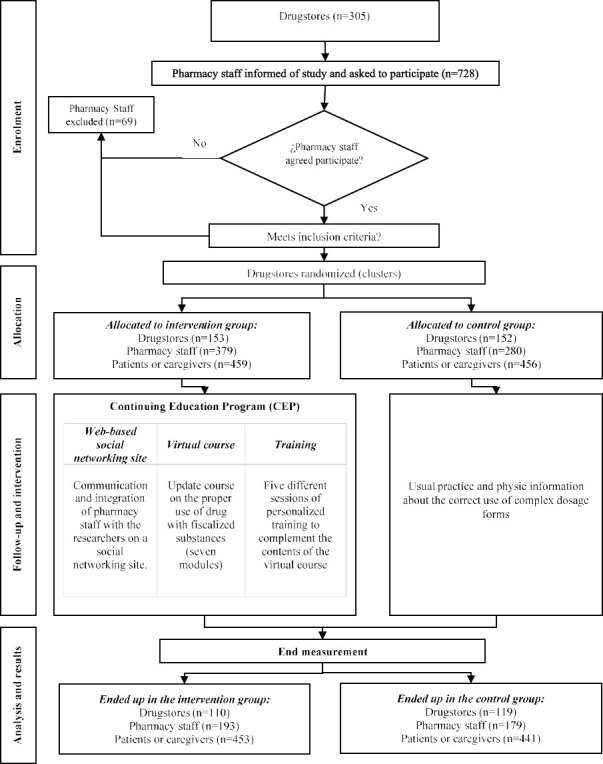财政药物继续教育计划对提高药房工作人员能力的有效性:一项多中心、集群随机对照试验。
IF 1
Q3 PHARMACOLOGY & PHARMACY
Pharmacy Practice-Granada
Pub Date : 2022-07-01
Epub Date: 2022-09-01
DOI:10.18549/PharmPract.2022.3.2632
引用次数: 1
摘要
背景:含有财政管制物质的药物如果没有正确的处方,可能会导致不良副作用。药房工作人员需要提高他们的能力(知识、技能和态度),为提供流动药房服务和最大限度地减少用药错误做出贡献。继续教育计划(CEP)有利于获得有关健康促进、疾病预防和合理使用药物的相关和高质量信息。目的:评估继续教育计划的有效性,以提高药房工作人员的能力,从而提高使用财政物质的药物。方法:在哥伦比亚的药店和药店(流动零售机构)进行一项多中心、前瞻性、平行组、整群随机对照临床试验。干预小组获得了CEP:一个基于网络的社交网站、一个虚拟课程、一个配药信息系统和面对面培训。对照组(CG)接受了关于正确使用药物的一般书面材料。我们测量了药房工作人员的技能、态度和知识自我报告得分,并使用模拟患者技术来评估参与者在实际实践中的技能和态度。我们使用了一份为本研究设计的问卷,该问卷由一组专家进行了评估并进行了试点,结果显示Cronbachα为0.96。结果:305家药店和药店被分为两组:IG(n=153)和CG(n=152)。在750名潜在参与者中,88%(n=659)同意参与。两组药房工作人员在干预后的技能、态度和知识自我报告得分均高于基线;然而,IG的得分在统计学上显著高于CG。干预后,IG的自我效能感技能和态度提高了88%(25个中的22个),并且在七个评估的知识组成部分中的六个(结论:使用不同的教育策略提供继续教育计划提高了药房工作人员的能力(评估的知识和自报的技能和态度),以加强使用含有财政物质的药物。然而,在实际实践中,技能和态度没有改善。这些发现可能表明,药房工作人员需要额外的持续培训/可持续性。本文章由计算机程序翻译,如有差异,请以英文原文为准。

Effectiveness of a continuing education program of drugs with fiscalized substance to improve pharmacy staff competencies: A multicenter, cluster-randomized controlled trial.
Background: Drugs with fiscalized substances without a correct prescription may lead to undesirable side effects. Pharmacy staff needs to improve their competencies (knowledge, skills, and attitudes) to contribute to providing ambulatory pharmacy services and minimizing medication errors. Continuing education programs (CEP) could favor access to relevant and quality information on health promotion, disease prevention, and the rational use of drugs. Objective: To evaluate the effectiveness of a continuing education program to improve pharmacy staff competencies to enhance the use of drugs with fiscalized substances. Methods: A multicenter, prospective, parallel-group, cluster-randomized, controlled clinical trial was conducted in drugstores and pharmacies in Colombia (ambulatory retail establishments). The intervention group (IG) received a CEP: a web-based social networking site, a virtual course, a dispensing information system, and face-to-face training. The control group (CG) received general written material on the correct use of drugs. We measured pharmacy staff’s skills, attitudes, and knowledge self-reported scores, and the simulated patient technique was used to assess the participant skills and attitudes in real practice. We used a questionnaire designed for this study, which was evaluated by a group of experts and piloted and showed a Cronbach’s alpha of 0.96. Results: Three hundred five drugstores and pharmacies were enrolled in two groups: IG (n = 153) and CG (n = 152). Out of the 750 potential participants, 88% (n=659) agreed to participate. The pharmacy staff’s skills, attitudes, and knowledge self-reported scores post-intervention were higher than baseline in both groups; however, the IG had statistically significantly higher scores than the CG. Post-intervention, the self-efficacy skills and attitudes in the IG improved by 88% (22 of 25) and in six of the seven assessed knowledge components (p<0.001). However, the dispensing criteria evaluated with simulated patient methodology showed no statistically significant differences between groups in the pharmacy staff’s skills and attitudes in real practice. Conclusions: Providing a continuing education program using different educational strategies improved the pharmacy staff’s competencies (assessed knowledge and self-reported skills and attitudes) to enhance the use of drugs with fiscalized substances. However, there were no improvements in skills and attitudes in real practice. These findings could show that pharmacy staff needs additional and continuous training/sustainability.
求助全文
通过发布文献求助,成功后即可免费获取论文全文。
去求助
来源期刊

Pharmacy Practice-Granada
PHARMACOLOGY & PHARMACY-
CiteScore
3.90
自引率
4.00%
发文量
113
审稿时长
20 weeks
期刊介绍:
Pharmacy Practice is a free full-text peer-reviewed journal with a scope on pharmacy practice. Pharmacy Practice is published quarterly. Pharmacy Practice does not charge and will never charge any publication fee or article processing charge (APC) to the authors. The current and future absence of any article processing charges (APCs) is signed in the MoU with the Center for Pharmacy Practice Innovation (CPPI) at Virginia Commonwealth University (VCU) School of Pharmacy. Pharmacy Practice is the consequence of the efforts of a number of colleagues from different Universities who belief in collaborative publishing: no one pays, no one receives. Although focusing on the practice of pharmacy, Pharmacy Practice covers a wide range of pharmacy activities, among them and not being comprehensive, clinical pharmacy, pharmaceutical care, social pharmacy, pharmacy education, process and outcome research, health promotion and education, health informatics, pharmacoepidemiology, etc.
 求助内容:
求助内容: 应助结果提醒方式:
应助结果提醒方式:


